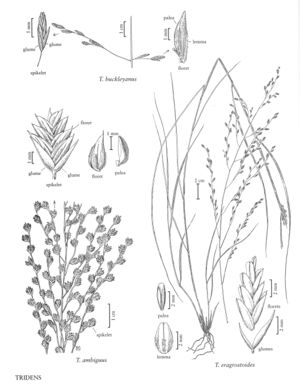Tridens buckleyanus
Plants cespitose. Culms 30-60 cm, erect; lower nodes sometimes hispid. Sheaths scabridulous, rounded; ligules 0.4-1 mm, membranous, ciliate; blades 1-4 mm wide, flat, apices attenuate. Panicles 10-28 cm long, 1-6 cm wide; branches (2)4-13 cm, widely-spaced, ascending to spreading; pedicels 1-2 mm. Spikelets 7-10 mm, pale to dark purple, with 2-5 florets. Glumes 1-veined; lower glumes 4-5(6) mm; upper glumes slightly shorter; lemmas 4-6 mm, midveins and back pubescent below midlength, lateral veins pubescent to well above midlength, midveins occasionally excurrent, lateral veins usually ending before the distal margins, rarely excurrent; paleas 3.5-4 mm, veins pubescent basally; anthers 1.5-2 mm. Caryopses about 2.5 mm. 2n = 32, "but this may be erroneous" (Gould 1975).
Discussion
Tridens buckleyanus is endemic to the southeastern portion of the Edwards Plateau, Texas. It grows on rocky slopes along shaded stream banks and the borders of woodlands.
Selected References
None.
